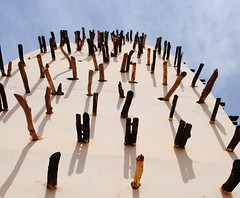After much reassurance that our new friend was a trustworthy chaperon to lead us on our musical outing, Aiwa the President of the Human Rights Association we were staying with finally agreed, ‘ok, you may go, but you must be back by 11 pm’.
It was already 9 pm and feeling rather limited by the mothering Imran replied quite perfectly, ‘Inshallah‘. Aiwa flashed a grin in our direction and nodded.
Armed with a guitar, camera and sound recorder we made our way through the dusty cratered streets of Nouakchott to the house of a family we had been told were great traditional Mauritanian musicians. Jeick Ould Chighaly welcomed us with warmth as we entered the busy household. Scattered around the generous sitting room were instruments of Mauritania. Jeick approached us with his electric guitar.
‘It as a quarter-tone guitar’ he casually exclaimed.
 Imrans eyes lit up as he cradled the guitar in his arms and explored each fret, twice as many as on a standard guitar. Jeick watched content at the shared enthusiasm.
Imrans eyes lit up as he cradled the guitar in his arms and explored each fret, twice as many as on a standard guitar. Jeick watched content at the shared enthusiasm.
With so many notes at his disposition, Jeick’s playing style is somewhere between the desert blues of Ali Farka Touré and a proficient oud player. After playing the electric guitar he then demonstrated his agility on the tidinit, a Mauritanian lute almost identical to the ngoni. We sat mesmarised by the improvised lines that could rival Bassekou Kouyaté‘s.
As Jeick played to us his intimate audience Noura his wife and fellow musician joined us. With little more than a brief salam Noura picked up the ardine and began to brush across its strings with eloquent skill. As she played we sat in awe of the beautiful harp-like sound.
The ardine is a 20-string harp with similar ancestry to the Kora. Unlike its Mande cousin, the ardine is played exclusively by women. In the region of West Africa where instrumentation is dominated by men, this female tradition is unique to Mauritania.
Noura Mint Seymali and her husband are very successful musicians both in Mauritania and on an international level, playing at Festival au Desert amongst many others. Her voice is rich and deep with resonating strength, Noura tells of of how she is not afraid to mix Griot traditions with other sounds,
‘On my album, I have traditional songs that are recorded as reggae pieces with drums, bass and saxophone’, she says with a smile.
But there is little talking, soon it is our turn to play. As we finish sipping our tea we play my song ‘Wine Merchant‘. There is no discussion of who we are, our cultures or traditions, yet a sense of musical connection hold on to us for the a couple of hours before Imran and I are forced to leave for our 11 pm curfew.
Noura invites us to form some kind of music project together, presumably blending our styles, Imran and I are instant to accept. We are forced to explain our visa situation, expecting this to be a major problem but Noura simply tells us to come back or they will meet with us in Mali. Relaxed to feel a natural sense of this only being the first meeting we would share we said our goodbyes, but not before I was welcomed to play the Ardine and presented with a gift of a stunning Mulafa (the traditional dress of the Moor women in Mauritania).
Cross-legged I clumsily plucked at the strings without a trace of the beauty and grace that Noura had displayed. Jeick sat with me and in the last moment of the evening we played the traditional song ‘Wading Deep Water’ with Jeick accompany on tidinit.
We parted leaving Jeick and his beautiful wife, Noura the Diva of the Sahel in Mauritania, the country we were only just beginning to discover.
UPDATE: since we wrote this blog Noura Mint Seymali has released a new CD (September 2013)!










